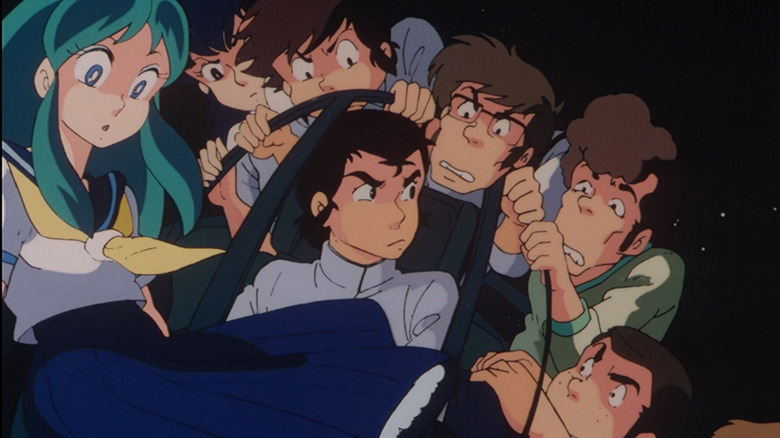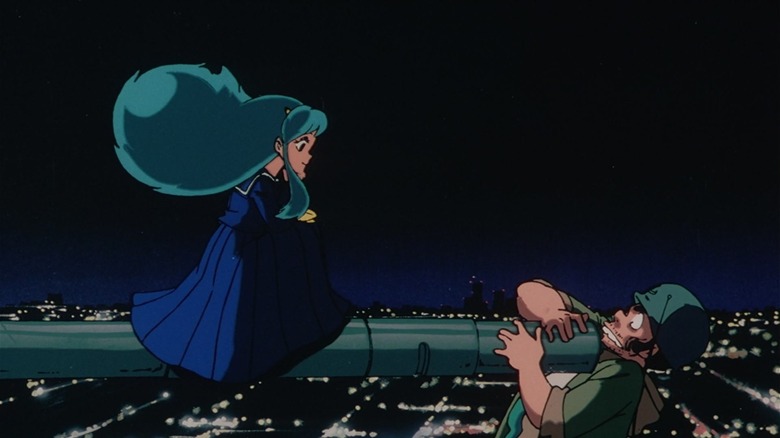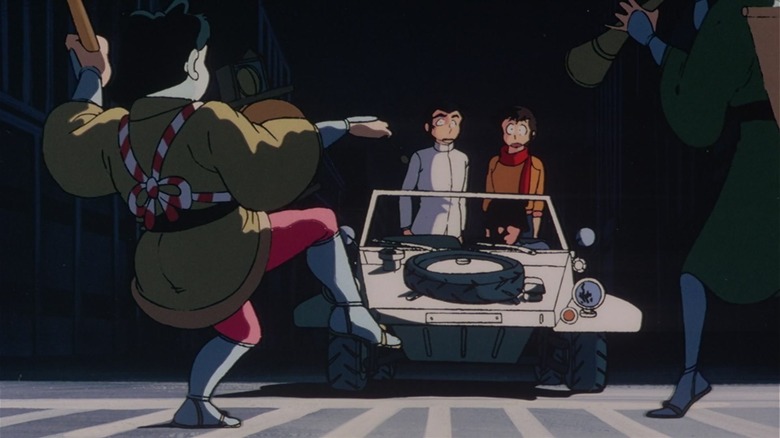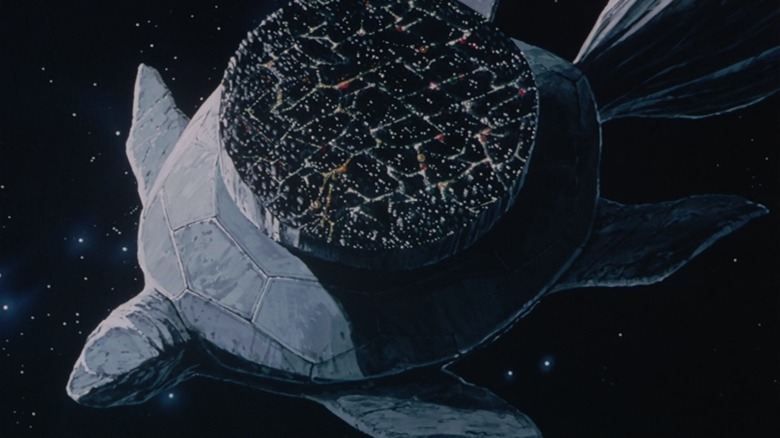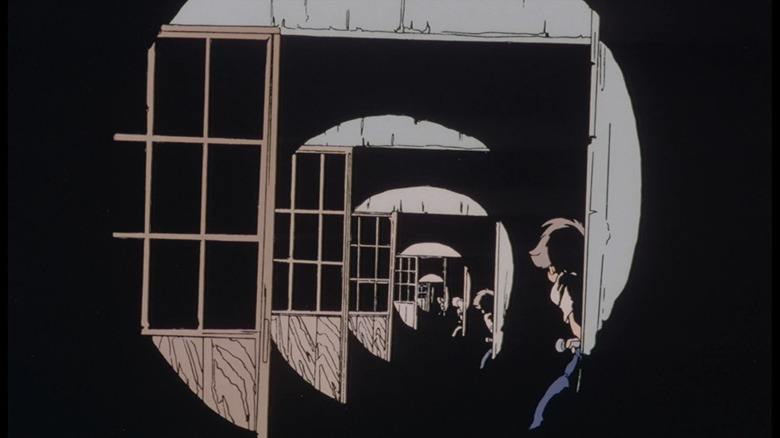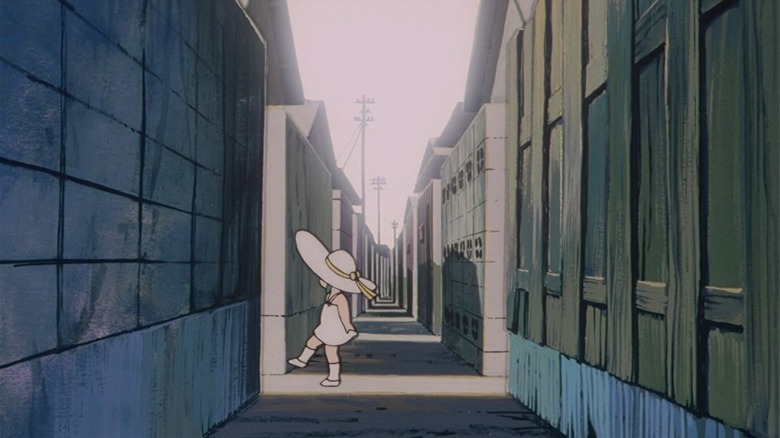The Daily Stream: Urusei Yatsura 2: Beautiful Dreamer Defied Formula To Become A Classic
(Welcome to The Daily Stream, an ongoing series in which the /Film team shares what they've been watching, why it's worth checking out, and where you can stream it.)
The Movie: "Urusei Yatsura 2: Beautiful Dreamer"
Where You Can Stream It: Crunchyroll, RetroCrush
The Pitch: Ataru is a horny teenage boy who wants to make out with every pretty woman he meets. Lum is a beautiful alien from outer space with lightning powers. Lum loves Ataru, but Ataru thinks Lum is annoying. So goes "Urusei Yatsura," one of the most popular anime series of the 1980s. Based on a comic by the queen of romantic comedy, Rumiko Takahashi, it ran for 194 episodes and launched the careers of many young animators and directors. The chief director of its first 106 episodes, Mamoru Oshii, would go on to direct such films as "Ghost in the Shell" and "Patlabor 2."
The strangest work by far in the "Urusei Yatsura" oeuvre is the second film, "Beautiful Dreamer." It begins with a student festival, where Ataru and Lum joke around with their friends. But as the days go by much the same, the characters realize that they've been trapped in a time loop by a mysterious force. As space disintegrates and people disappear one by one, the school nurse Sakura and local rich kid Mendou race to find a way out of this mess. But Ataru is useless as always, and what about Lum? "Beautiful Dreamer" reconfigures the hilarious world of "Urusei Yatsura" into a deeply weird and ambitious summer dreamscape. It's one of the most beloved anime films of the 1980s, but Brian Ruh claims in his book, "Stray Dog of Anime," that it inspired angry "Urusei Yatsura" fans to send Oshii razor blades in the mail.
Why it's essential viewing
The "Urusei Yatsura" anime has always been a show of two parts. The first stems from the appeal of the source material. "Urusei Yatsura" is an early work by Rumiko Takahashi, and lacks the polish distinguishing later successes like "Maison Ikkoku" and "Mermaid Saga." Even so, the series has plenty to recommend it. According to Matteo Watzky in his piece "Understanding Urusei Yatsura," it was Rumiko Takahashi who brought romance from the pages of Japanese girls comics (shojo manga, like "Fruits Basket") to boy's comics (shonen manga, like "Fullmetal Alchemist"). Lum was an appealing character who won over an emerging audience of male fans that adored cute and innocent girls (including Nausicaa from a certain Miyazaki's "Valley of the Wind"). Lum also throws a spanner into an otherwise straightforward cishet teen boy sex fantasy. She's an all-powerful force of chaos that steals the show from the perpetually frustrated "protagonist" Ataru. The series skewers traditional values, grounds myth in the absurd everyday, and even plays with gender norms.
The second part stems from the anime staff, which repeatedly bucked against the source material. While the "Urusei Yatsura" comic was drawn by a woman, the anime series (save for key talent like famous character designer Akemi Takada) was predominantly made by young men. These men, led by director Mamoru Oshii, became increasingly bold in revising Takahashi's material when it suited them. "Urusei Yatsura" became a platform for young animators to outdo each other each week, bringing their own special flair to the source comic. Shortly after, it became a space to explore their obsessions. Some later episodes, like the murder mystery "And Then There Were None," had little to do with Takahashi's work at all.
Boiling water for tea in the wee hours of the morning
Even "Urusei Yatsura" had limitations, and the staff soon found themselves boxed in by formula. Mamoru Oshii was especially disappointed with the first anime film in the franchise, "Only You." The film was well-liked by fans, enough so that producer Yuji Nunokawa kept Oshii onboard despite his unpredictable behavior. But as far as Oshii was concerned, "Only You" was just a longer TV episode. "In movies," he said in an interview with Central Park Media, "your focus is more on what kind of society and what kinds of central themes you want to portray." Oshii wanted to make something worthy of being aired in cinemas — something that would permanently raise the bar for the series.
"Beautiful Dreamer" was designed to be a more focused experience than "Only You." Ataru's classmates take the spotlight while Lum's alien friends are ignored. Rather than an inciting incident, the film begins in medias res, as the characters find themselves trapped in "something that has already begun." Oshii and his staff were tired when they made "Beautiful Dreamer." They were tired of the "Urusei Yatsura" formula, tired of the endless grind of anime production. Oshii decided that he wanted to make a film that would reflect that tiredness. "I want to build our story in a scene where our characters boil water for tea in the wee hours of the morning," he said to Central Park Media. A story whose characters were capable of mundane behavior as well as absurdity.
'This film became my revenge'
"Beautiful Dreamer" skews even further towards Mamoru Oshii's interests than the series ever did. Oshii loves military technology, and so the film features a Leopard tank as well as a Harrier jet. As reality deteriorates in Lum and Ataru's closed universe, characters sink into puddles and dissociate in dark alleyways. The local high school mutates into an MC Escher realm of shadows and stairs. Ringing furin bells, debilitating summer heat, and crumbling buildings impart a sense of unease. Years before Satoshi Kon blurred the line between reality and dream in Japanese animation, "Beautiful Dreamer" laid the groundwork for what that might look like. It was the first of Oshii's filmography to be recognizably that of Oshii the auteur. "This film," Oshii said to Central Park Media, "became my revenge."
At the same time, "Beautiful Dreamer" is more than just an Oshii film. You can't have "Urusei Yatsura" without character designer Akemi Takada. Other prominent talent from the series, like Kazuo Yamazaki and Yuji Moriyama, came onboard to deliver their best work yet. A notable new addition is the film's art director Shinichiro Kobayashi. Kobayashi was already one of the medium's greatest art directors back then, and would go on to design the worlds of classics like "Revolutionary Girl Utena" and "Berserk." He brought a sense of surreal magnificence and decay to "Beautiful Dreamer" that hadn't been seen in any other "Urusei Yatsura" entry up to that point. The team's wildest ideas, like the image of Lum and Ataru's neighborhood floating through space on the back of a giant turtle, would simply not work without an artist of Kobayashi's caliber at the helm.
An endless loop of barely distinguishable days
"Beautiful Dreamer" was ahead of its time in many ways. It's the first film to demonstrate Mamoru Oshii's full strength as a director, and one of the first anime franchise films to selfishly defy fan expectations. A year later, "Goshogun: The Time Etranger" would pull a similar trick by staging a heartfelt drama within the mind of a giant robot show's aging heroine. "Beautiful Dreamer" wasn't the first time loop story by a long shot, but the device was a perfect fit for the never-ending romantic comedy world of "Urusei Yatsura." In his review of "Beautiful Dreamer," Austin Jones writes for Otaku USA that "these characters were already trapped in an endless loop of barely distinguishable days." By making that explicit, "Beautiful Dreamer" introduces genuine strangeness and terror into the show's world while still finding time for jokes and sentiment.
Still, there were many who did not like "Beautiful Dreamer" at the time of its release. Ataru and Lum spend much of the film away from the spotlight. The film's two most active characters, Sakura and Mendou, act more like heroes from later Oshii movies than their typical selves. While the appeal of "Urusei Yatsura" typically comes from the characters and their interactions, "Beautiful Dreamer" is much more focused on the implications of its dream world. The film is an artistically satisfying work on its own, and plays with the audience's love of the series to great effect. But it exists uncomfortably within the "Urusei Yatsura" universe, being both its creative zenith and its first great betrayal. Oshii left the TV series soon after.
Those obnoxious aliens!
A new "Urusei Yatsura" anime series began airing in 2022. Made by david production, the studio behind the fan-favorite adaptation of "Jojo's Bizarre Adventure," it positions itself as a faithful companion to Rumiko Takahashi's original classic. This new season has its charms, particularly its opening credits headed by Shingo Yamashita. But the original "Urusei Yatsura" wasn't just charming. It was a cultural event, a once-in-a-generation meeting of artists as important to the 1980s as "Sailor Moon" was to the 1990s. "Urusei Yatsura" could be a touching love story, a zany comedy, or, as in "Beautiful Dreamer," a mind-melting existential thriller that bewildered and enraptured fans in equal measure.
Mamoru Oshii recently returned to the anime industry to make shows with his director friend Junji Nishimura. His newest work is "The Fire Hunter," a fantasy series that feels uniquely out of time in good and bad ways. Oshii's still devoted to pushing the boundaries of the anime industry, but don't expect to see another "Urusei Yatsura" from him either. Lightning never strikes twice in the same spot. Instead, look towards the outrageous experimentation of "Bocchi the Rock!," or the explosive adolescence of "Mob Psycho 100." Or somewhere else entirely. There will never be another "Beautiful Dreamer," but I hold out hope that anime is still capable of producing something just as unexpected.
